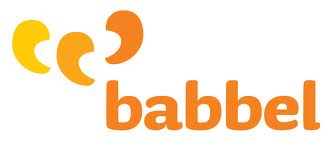
 Long time readers of this site may remember that in the past, I have reviewed many different sites, apps and solutions to assist with learning a foreign language. Now I’m looking at some newer language learning sites, namely Babbel and LiveMocha, that offer some interesting and unique things.
Long time readers of this site may remember that in the past, I have reviewed many different sites, apps and solutions to assist with learning a foreign language. Now I’m looking at some newer language learning sites, namely Babbel and LiveMocha, that offer some interesting and unique things.
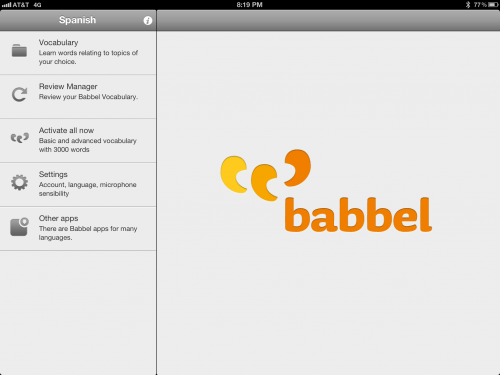
In addition to the sites, Babbel offers companion apps for both iOS devices and Android devices. LiveMocha offers over-the-counter learning kits that you can purchase at brick and mortar stores like Barnes and Noble. Babbel takes a slick and professional look, feel, and approach, but only offers a few languages. LiveMocha takes a more collaborative learning environment, where people help each other learn and offers more language choices, but isn’t quick as slick or polished as Babbel. That said, I’m going to take a deeper look at both offerings and compare a bit how they approach language learning and what each site brings to the table.
Babbel offers lessons in 11 languages (Dutch, English, French, German, Indonesian, Italian, Polish, Portuguese, Spanish, Swedish, and Turkish)) You can choose your reference language (the language your lessons are given in) from 6 languages (English, German, French, Italian, Portuguese, or Swedish). This is far fewer languages than a close competitor, LiveMocha (offering more than 35 languages and more than 10 reference languages), but Babbel is attempting to do more of a variety of things in each of their lessons than LiveMocha, so that isn’t too big a surprise. On Babbel, each lesson has a number of different parts. With a properly configured microphone, the lesson will say a word or phrase which you then repeat. Then the site does something unique – it analyzes what you said and compares it with the sample and it gives you a score indicating how well you said the word or phrase. If you spoke well enough, you move on. You are taught a number of words and/or phrases in each lesson.
There are written parts to the lesson as well. You are expected to learn to type (spell) words as well as use them to fill in the blanks in sentences. These are often accompanied with basic grammar explanations. All in all, it’s a pretty thorough overview of the words and phrases you are being taught. One downside, however, is that the website uses a subscription model, like LiveMocha; unlike its competitor, LiveMocha, you can only do a sample lesson for free. LiveMocha generally allows you to do the early courses for free. Each course consists of 3 units with 5 or 6 lessons in each unit so you can cover a lot of material for free! This may be a necessary business reality, however, since lessons on Babbel are produced a bit more professionally, rather than the primarily volunteer/shared/collaborative learning model followed by LiveMocha.
At LiveMocha, you are presented an approach that is vaguely like that offered by the Rosetta Stone courses. Each lesson is broken into 4 parts: Learn – where you see images and hear and see the word or phrase associated with that image, Review – where you choose the correct image when presented with the word/phrase either in writing or verbally, Write, where you are asked to produce sentences or answer questions (as you progress), and Speak – where you asked to read aloud a paragraph.
In these last two parts, your responses are submitted to other users who have indicated that their “native” language is the one you are learning. They critique your exercises and offer advice, etc. In turn, you critique reviews from people trying to learn your language. You earn credit for these activities that can lead to bonuses like access to other learning tools and content. There is also premium content available for purchase (via subscription).
When looking at both sites, I really like the look and feel of Babbel, but I don’t like the cost and I don’t like the lack of languages I want to learn. Babbel offers subscriptions to the site for $12.95/month (if you pay monthly), $8.95/month (if you pay for 3 months at a time), or $7.45/month (if you pay for 6 months at a time). This does NOT include the cost of the mobile apps which are free, and it includes one vocabulary list but then cost $1.99 for a month of content, $3.99 (3 months at $1.33 each month), $5.99 (6 months at $1 each month), or $24.99 for unlimited access. For the apps it is only for one specific language, but with the website you can change your learning language during the subscription period.
LiveMocha actually lets me touch more content for free, but there are occasionally mistakes and widely varying audio clip quality, especially on languages that are less popular. The subscription prices vary based on the popularity of the language (some of the less popular ones are free), but there is what is called a “Gold Key” that you can use to purchase access to ALL the languages, ALL the exercises, and ALL the bonus materials. You can purchase for $9.95 per month, or a 1 year subscription for $99.95 ($8.33/month). Additionally, they have language kits in the most popular languages available for $49.95 (list price) although I’ve seem them for less on Amazon.
A little side site rant: Something I don’t like, is that both sites are Flash dependent. Come on folks, it’s time to move away from Flash, ok? It is definitely not necessary for the functions available on each site, so I say it’s time to make the switch to HTML5! 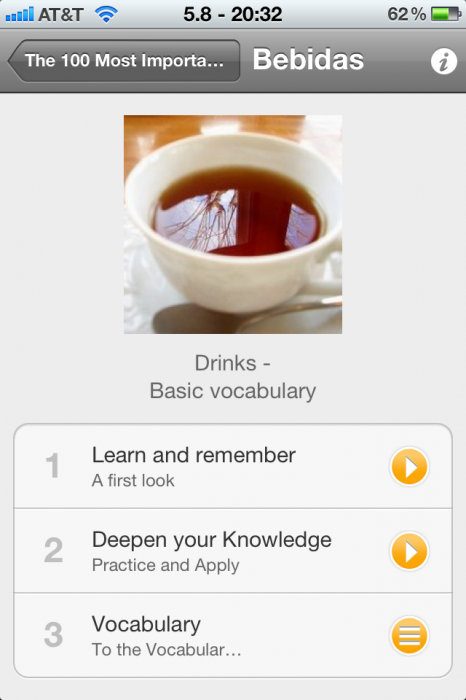
Back to the site specifics, Babbel uses an automated process to gauge the quality of your speech and correct/incorrect answers to the exercises you answer on the site. This doesn’t always recognize differences in accents and dialects, and it is very sensitive to outside noise. No practicing in the airport! LiveMocha uses, as I mentioned, images matching with written words/audio clips you listen to, but then offers writing and speaking exercises that are reviewed by peers who speak the language you are learning.
This is both good and bad. Good, because and actual speaker is listening to you and reading what you wrote, but bad because you really may have good and bad reviewers – you really must pay attention to what they say and the helpfulness scores they receive to know if their comments are useful or not. Additionally, they may say you spoke badly, but it may be because they speak a particular dialect of the language that is a little different from what you are learning via the audio clips. Those variations make it sometimes difficult to know how to interpret the reviews you receive, but they are also probably reflective of what you are going to find in real life if you try to use the language you are learning!
Looking at the materials available outside of the site, Babbel offers mobile apps. They have apps for iOS (both iPhone/iPod touch, and iPad), and for Android devices. The apps are basically a way of reviewing your vocabulary. Although there is a recording function, it doesn’t appear to evaluate your speech like the website does. LiveMocha’s non-site offering is the language kit which, for the $50 list price, gives you 4 companion books (a collaboration between LiveMocha and Merriam-Webster/Collins) and a 6 month LiveMocha membership.
Overall, I do like both sites and the tools and resources each offers. Babbel is definitely stronger in its speech recognition technology, production values, and its mobile apps, but LiveMocha offers more languages, real, meaningful interaction with native speakers (written and spoken), and more elaborate lessons. You would benefit from either or both sites, but ultimately it depends on what kind of learning suits you best. For me, my best language learning approach consists of a combination of a strong grammar foundation (either from books or classroom), combined with access to lots of vocabulary (both written, as in dictionaries, and oral as offered online or via apps), and access to native speakers for better understanding of use, context, and proper pronunciation. I like a combination of live instruction, books, apps, and online services/sites. One thing all of these sites could use is more reading and listening comprehension. LiveMocha offers some in its premium content, but overall, none of these sites offers nearly enough!
I actually learn more from the approach that LiveMocha has taken – they approach language learning as a communal process, much in the way you learned your native language, variations, inconsistencies,and all – the same as in the “real” world! That has worked well for me. The more structured approach of the Babbel site might work well for people who learn more easily without some of the ambiguities that live people, who are not instructors, can bring to the picture.
Either way, you’ll learn a lot! If you want to enhance your language learning you should check out both Babbel and LiveMocha and see how far language instruction has come! How do you learn best? What have been your language learning experiences,and what worked for you?
Babbel is available on the web, and as an apps (single language) for iOS and Android.
MSRP: First lesson free, then $7.45-$12.95 / month depending on number of months pre-purchased (language switching is permitted). Apps are free but content (for a single language) costs $1.99-$5.99 depending on months of subscription purchase or $24.99 for access that doesn’t expire.
What I Like: Beautifully produced. Speech recognition and scoring is very cool!
What Needs Improvement: More free access to early lessons. More access to native speakers. More languages! Needs to move away from Flash and onto HTML5!
LiveMocha is available for many languages on the web, and as a retail kits for a variety of languages (with books and 6 months subscription to web content).
MSRP: Language prices vary, but all basic lessons are free. Advanced lessons and bonus content for ALL languages at once are available for $9.95/month or $99.95/year (currently you can buy as a gift subscription for only $49.95/year). Retail kits list for $49.95 (each language).
What I Like: Wide variety of languages supported (over 35), some for free. Managed interaction with (and feedback from) native speakers is invaluable!
What Needs Improvement: Content needs to be reviewed more frequently by experts for mistakes or improvements (although user comment system helps flag these things). Audio quality needs to be a bit more consistent. Needs to move off of Flash and onto HTML5!

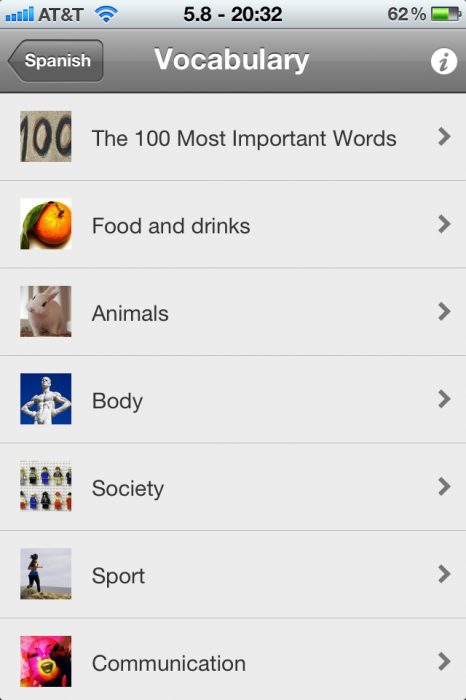
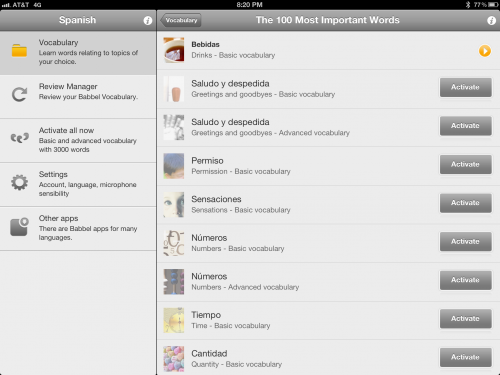
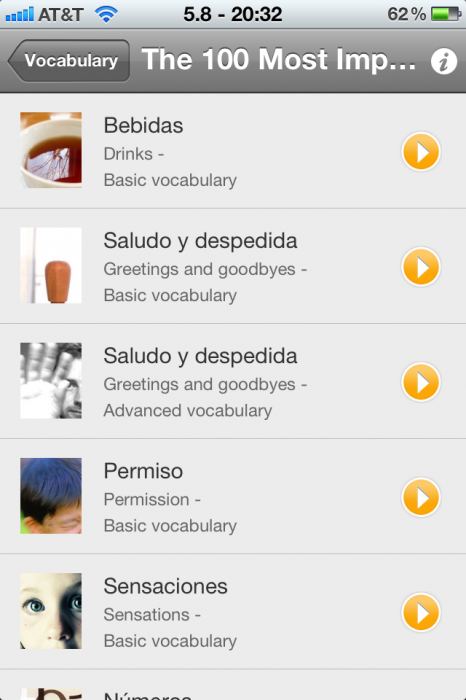
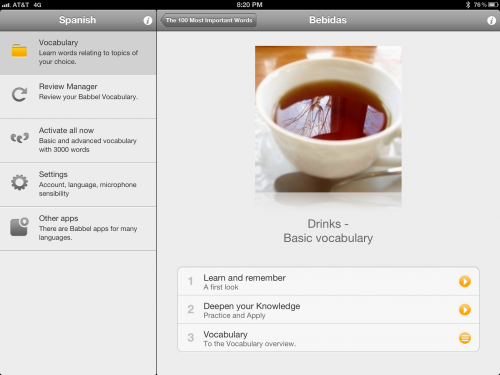

I was able to score a LiveMocha Gold Key at the beginning of the year for only 9.95 during a mega New Year’s sale they had…but I really haven’t used it very much, and that makes me sad. Being required to use a computer in order to deal with their Flash stuff is really annoying. They would make so many users happy if they made either a full iOS app or switched from Flash to HTML5.
Learning languages is just more fun for me when I’m not tethered to a computer and can study anywhere. I’ve used apps like remote connections or Flash browsers on my iPad to do lessons, but I can’t use the voice recording at the end of the lesson, so it’s kind of useless. I would love to be able to do voice recordings and practice using my iPad or iPhone…that just seems natural to me.
You got an excellent deal! And I totally agree with you about the hurdles that their Flash implemetation creates to learning wherever and whenever you want! I have sent recommendations to both sites encouraging them to abandon Flash. In the meantime, I find myself using one of those alternate browsers to complete all parts of the lesson except the audio part, then doing my recording when I have my laptop handy. Not as convenient as I would like however. I also have (and many others have) requested that LiveMocha create a full-function app. I suspect, however, that their content is going to be a challenge to convert to that kind of portability. There are quite a few legacy components there that they have to figure out how to re-purpose or re-work. It’s a significant undertaking that would affect the core website too, I think. That said, I still think they would do well to take on the challenge! More portability!
Hey Jessica,
You got a good point here! That’s why one of our biggest projects at babbel is to replace the Flash-Tutorials with Java-Script and HTML.
@Chris Thank you very much for this nice review!
Hey Jessica,
You got a good point here! That’s why one of our biggest projects at babbel is to replace the Flash-Tutorials with Java-Script and HTML.
@Chris Thank you very much for this nice review!
Hi Chris, Thanks for spreading the word for Babbel.
If you are a subscriber to Babbel’s webservice you can login within the iPad app with your Babbel-ID. By doing this we will unlock all additional content without any extra costs.
The In-App subscription plan is for people who want to learn on ther iPad only.
Best,
Dari
Babbel mobile team
Hi Chris, Thanks for spreading the word for Babbel.
If you are a subscriber to Babbel’s webservice you can login within the iPad app with your Babbel-ID. By doing this we will unlock all additional content without any extra costs.
The In-App subscription plan is for people who want to learn on ther iPad only.
Best,
Dari
Babbel mobile team
There was no email or any notice reminding customers that the account is about to be auto renewed. Babbel expects its customers to remember to cancel the account six months after they first paid. There is no option to not auto renew. So six months later, I am no longer using Babbel but found a surprised charge on my credit card. Immediately I contacted Babbel to cancel my membership and to request a partial refund. I am reasonable. I didn’t remember, six months later, that my Babbel account would be auto renewed. I will pay for the 20 days that I forgot. But I am not using this service anymore. I don’t want to pay for another six months. No. Babbel simply refuse. “Oh you were told, six months ago, in one tiny line, that your account would be auto renewed”. “Oh, it is stated in the FAQ if you bothered to go looking for it”. Let’s summarize: 1) expecting its customers to remember to cancel every six months; 2) not providing so much as an email reminding that auto renew is about to occur; 3) refusing to partially refund for the auto renewed amount. All points to an unethical business that its only way to retain customers is by tricking them. Had Babbel partially refunded my auto-renewed subscription fee, I would consider using Babbel again in the future when I actually have time to use its service again. I am on auto renew with many online services, but none of them is this desperate for $40 that they are willing to make a customer a lifetime enemy.